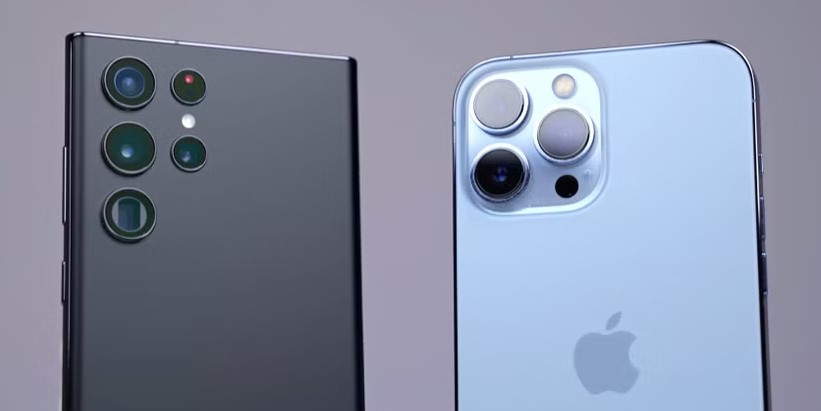When it comes to smartphones, the battle between Samsung vs iPhone has dominated the tech world for years. These two tech giants have long been at the forefront of innovation, consistently offering some of the best devices on the market. But the big question remains: Which is better Samsung or iPhone? Let’s break it down and see who wins the battle head-to-head.
Design and Build Quality
One of the first things you notice about any smartphone is its design. Apple has always prioritized sleek, minimalist aesthetics. The iPhone is well-known for its premium build quality, typically using aluminum and glass, giving it a luxurious feel. With consistent designs and a focus on simplicity, the iPhone is undeniably beautiful.
Samsung, on the other hand, offers more variety. Its flagship Galaxy models feature curved screens, bezel-less displays, and a more futuristic vibe. Samsung often experiments with its design, like folding phones and large displays, pushing the boundaries of what a phone can look like. If you’re someone who enjoys variety and innovation in design, Samsung may catch your eye.
Winner: It’s a draw here. Both brands deliver stunning devices, but it comes down to personal taste—iPhone for classic elegance, Samsung for cutting-edge creativity.
Please follow us on Facebook and Twitter.
Display
When it comes to displays, Samsung is hard to beat. The company has been a leader in display technology for years, and it shows. Samsung’s AMOLED screens are vibrant, with deep blacks and stunning color accuracy. Whether you’re watching videos, gaming, or just scrolling, Samsung’s displays are breathtaking.
Apple, while not falling too far behind, uses OLED displays in its higher-end models. The screens are sharp and clear and provide a great viewing experience. However, when compared side by side, Samsung’s displays tend to be a bit more eye-popping in terms of brightness and contrast.
Winner: Samsung wins this round, especially for users who care about having the best possible display for media consumption.
Operating System and User Experience
Here’s where the divide is most obvious. iPhones run on Apple’s iOS, while Samsung devices use Android (with their custom One UI overlay). iOS is known for its simplicity, stability, and seamless integration across Apple devices. It’s intuitive and user-friendly, which is why so many people love it. However, it can feel limiting for users who enjoy a bit more customization.
Samsung, running on Android, offers way more flexibility. You can customize everything from the home screen to the app icons, and there’s a massive variety of apps and widgets. Android also supports multitasking better than iOS, especially with Samsung’s split-screen capabilities. However, the experience may not feel as streamlined, and there’s often a bit more bloatware.
Winner: This depends on personal preference. iOS offers a cleaner, more controlled experience, while Android is perfect for those who want to tinker and personalize.
Performance and Power
Apple has always been known for optimizing its hardware and software to work perfectly together. The iPhone’s A-series chips (like the A17 Bionic in the latest models) are incredibly fast and efficient. Even with less RAM than some Android counterparts, iPhones tend to outperform in real-world tasks and are renowned for their longevity.
Samsung, while packing impressive specs like the Snapdragon or Exynos processors, typically needs more RAM to keep up with Apple’s smoothness. That said, Samsung’s latest models are no slouches—they’re powerful, fast, and handle multitasking with ease. But the optimization isn’t always as tight as it is on an iPhone.
Winner: Apple takes the edge here due to its unmatched optimization of hardware and software, but Samsung is not far behind, especially for users who want powerful hardware.
Camera
Smartphone cameras are a major selling point, and both brands excel here. iPhones have always had excellent cameras that provide great color accuracy, natural lighting, and consistent performance across all conditions. The new Pro models with multiple lenses offer professional-grade photography features.
Samsung’s cameras, especially in the Galaxy S series, are incredible, too. They often provide more megapixels and offer advanced features like 100x zoom, which iPhones don’t match. Samsung also tends to enhance images more than the iPhone, giving photos a vibrant, punchy look that some users love, while others prefer the more natural photos iPhones produce.
Winner: It’s a toss-up. iPhones excel in overall consistency, while Samsung impresses with innovation and features like Zoom.
Battery Life
Battery life can make or break a phone. Recent iPhones have made significant improvements, offering all-day battery life even with heavy usage. However, Samsung phones, especially the higher-end models, often have larger batteries and faster charging options. Samsung also offers reverse wireless charging, which can be a neat feature.
Winner: Samsung takes this round, especially with its larger battery sizes and versatile charging options.
Price
There’s no denying that both Samsung and Apple sell premium devices, but iPhones tend to be more expensive. Samsung offers a broader range of price points, with budget, mid-range, and flagship options, making it easier for people to find a phone that fits their budget. Apple, while offering a few less expensive models like the iPhone SE, tends to focus primarily on high-end, pricey devices.
Winner: Samsung provides more options for different budgets, giving it the edge here.
Conclusion

At the end of the day, there’s no definitive winner in the Samsung vs. iPhone debate it all depends on what you value in a smartphone. If you want a customizable, feature-rich device with the best display and camera innovation, Samsung might be for you. If you prefer a more streamlined experience with top-notch performance, simplicity, and a reliable camera, the iPhone will fit your needs. Ultimately, the best choice is the one that works best for your lifestyle and preferences.






